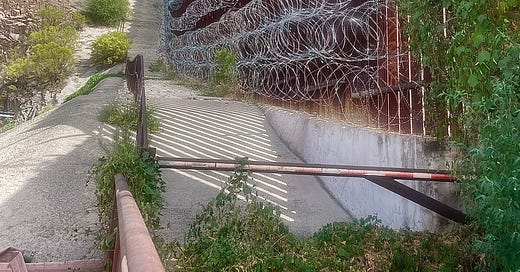Finding beauty in an undignified place
On the border, a fence divides, but doesn't sever connections.
I write to you from a bench on Morley Avenue, the commercial beating heart of the border city of Nogales, Arizona. I’m escorting a group of 11 international journalists on a visit to one of the most notorious and poorly understood parts of the United States. Ahead of me, I see a barrier of tall steel posts layered in concertina wire that follows the undulating topography between two countries and splits a single community into two.
Weed is climbing on the wire, hiding it from sight bit by tiny bit, nature’s attempt at adding color — beauty, even — to an undignified place.
This is my first time back to this stretch of the border since April 2021, when I wrote a column for The Washington Post about the damage brought by the pandemic to American businesses whose survival depends on Mexican clients. Such is life on the borderlands: What happens on one side flows into the other, reverberates on the other, affects lives regardless of language, nationality or citizenship status.
This time, I found Morley Avenue battered yet pulsing again. There is music playing inside stores. There are cars traveling up and down the street, and people walking up and down the sidewalks, and hope for better days ahead in spite of the divisive narrative that has come to define a place defined by connections. There’s a museum on Morley Avenue, its walls covered in colorful oil paintings. There’s also a gallery where artists from Nogales, Arizona, and Nogales, Mexico, display their work side by side, like the good neighbors that they are.
There’s so much creative energy on the border, so much potential. We only need to look beyond the misleading headlines to see it.
I wrote for High Country News about a border crosser who is more of an American than I’ll ever be. He is an undocumented immigrant whose parents brought him to the U.S. as a child and whose fate is as much in limbo as the future of the Obama-era program that has given him and hundreds of thousands of others temporary protection from deportation. Here is an excerpt:
Over the years, I’ve come to appreciate, on a granular level, how policy and politics can at once propel and destabilize the trajectory of a person’s life. I’ve come to understand on a personal level … how the decisions that judges and legislators make (or don’t make), can defile the essence of what it means to be an American, whether those decisions stem from a misguided sense of righteousness or are made for the sake of electability.
I hope you get to read it and if you do, I look forward to hearing what is your definition of American.
With love and purpose, always.
Fernanda.





